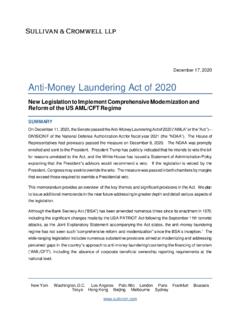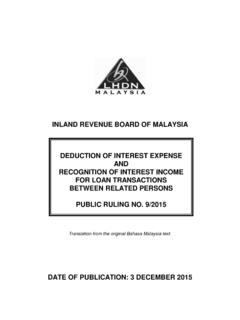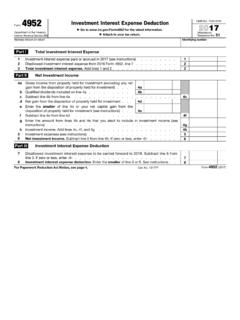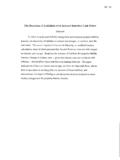Transcription of IRS Issues Proposed Regulations on Section 163(j) Interest ...
1 New York Washington, Los Angeles Palo Alto London Paris Frankfurt Brussels Tokyo Hong Kong Beijing Melbourne Sydney December 31, 2018 IRS Issues Proposed Regulations on Section 163(j) Interest Deduction Limitation Proposed Regulations Would Implement and Provide Guidance Regarding the New Section 163(j) Provisions SUMMARY The Internal Revenue Service (the IRS ) and the Treasury Department recently issued Proposed Regulations (the Proposed Regulations ) addressing the limitation on deductions for business Interest expense under Section 163(j) of the Internal Revenue Code (the Section 163(j) Limitation ). As discussed in more detail below, the Proposed Regulations provide critical guidance regarding many of the technical provisions in Section 163(j) as well as the application of Section 163(j) to different types of entities, including partnerships, controlled foreign corporations and corporate members of a tax consolidated group.
2 Highlights of the Proposed Regulations include the following: The definition of Interest for Section 163(j) purposes is defined broadly to include not only amounts generally treated as Interest for federal income tax purposes, but also certain items of income and expense that are related to debt instruments, such as substitute Interest payments under a securities loan, gains and losses from hedges of debt instruments, commitment fees and debt issuance costs. The Proposed Regulations include a broad anti-avoidance rule under which any deductible expense or loss predominantly incurred in consideration of the time value of money would also be treated as Interest expense for Section 163(j) purposes. The determination as to whether Interest expense that is incurred by a partnership is subject to Section 163(j) is made at the partnership level based on the income and expenses of the partnership. Any disallowed Interest under Section 163(j) would then be allocated to the partners in the partnership.
3 A controlled foreign corporation ( CFC ) would be subject to the Section 163(j) limitation for purposes of computing subpart F income, GILTI tested income or loss, and income effectively connected to a United States trade or business. -2- IRS Issues Proposed Regulations on Section 163(j) Interest Deduction Limitation December 31, 2018 The Section 163(j) Limitation of a consolidated tax group would be applied to the group as a whole as if the group were a single taxpayer and would not be applied separately to each member of the group. The Proposed Regulations include detailed rules and procedures in order to elect to treat certain businesses as exempt from Section 163(j) and for allocating Interest income and expense between exempted businesses and non-exempted businesses. BACKGROUND As part of last year s comprehensive tax reform bill passed in December 2017 (the Tax Reform Act ),1 Congress enacted new rules limiting the deductibility of net business Interest expense by taxpayers.
4 Prior to the Tax Reform Act, Section 163(j) disallowed deductions for disqualified Interest paid or accrued by corporations to related parties if the payor s debt-to-equity ratio exceeded a statutory threshold and the payor s net Interest expense exceeded 50% of the payor s adjusted taxable Section 163(j), as amended by the Tax Reform Act, disallows a taxpayer s business deductions for net Interest expense, generally defined as the excess of business Interest expense over business Interest income, if such net Interest expense exceeds 30% of the taxpayer s adjusted taxable income ( ATI ). This limitation applies irrespective of whether the Interest is paid to related or unrelated parties. For taxable years beginning prior to January 1, 2022, the ATI of a taxpayer is generally equal to its taxable income after adding back non-business and exempt business income and deductions, Interest , taxes, depreciation and amortization (subject to certain other adjustments).
5 3 The Section 163(j) Limitation for subsequent taxable years will be determined in the same manner without any add-back for depreciation and The Section 163(j) Limitation applies only to business Interest and does not apply to investment The statute provides that the Section 163(j) Limitation applies to a partnership at the partnership level and not at the partner There is no grandfathering for debt issued prior to the enactment of the Tax Reform Act. Certain real estate businesses,7 regulated utilities,8 and small businesses (with $25 million or less of gross receipts)9 are exempt from the Section 163(j) Limitation. The Section 163(j) Limitation also does 1 The formal name for the Tax Reform Act is An act to provide for reconciliation pursuant to titles II and V of the concurrent resolution on the budget for fiscal year 2018. See S&C publication of December 20, 2017, Tax Reform, for a description of the key provisions included in the legislation.
6 2 See Former Section 163(j)(1)(A), (2)(A). 3 See Section 163(j)(1), (8). 4 See Section 163(j)(8)(A)(v). 5 Section 163(j)(5). 6 Section 163(j)(4)(A)(i). 7 Section 163(j)(7)(A)(ii). 8 Section 163(j)(7)(A)(iv). -3- IRS Issues Proposed Regulations on Section 163(j) Interest Deduction Limitation December 31, 2018 not apply to Interest on floor plan financing indebtedness (indebtedness used to finance the acquisition of motor vehicles held for sale or lease or secured by such inventory).10 Deductions disallowed by the Section 163(j) Limitation are generally carried forward in the same manner as net operating loss Thus, subject to a special rule for partnerships, disallowed business Interest deductions may be carried forward indefinitely. A taxpayer s disallowed business Interest deductions are also subject to limitation following a change in ownership of the DISCUSSION The Proposed Regulations provide guidance on a wide range of Issues with respect to the application of Section 163(j).
7 This memorandum discusses some of the most important provisions of the Proposed Regulations and highlights significant consequences and Issues under the Proposed Regulations . A. DEFINITION OF Interest The Proposed Regulations provide that amounts generally treated as Interest for tax purposes would also be treated as Interest for Section 163(j) Accordingly, Interest would include, among other things, original issue discount, market discount, acquisition discount, deductible repurchase premium, certain deferred payments in exchange for property that are treated as Interest for tax purposes, imputed Interest with respect to certain below-market loans, and amounts treated as Interest under certain rental agreements that provide for deferred or prepaid rent. Moreover, solely for purposes of Section 163(j), the Proposed Regulations would broaden the definition of Interest to encompass various types of payments having similar effects to Interest , even if such payments are not otherwise treated as Interest for tax In particular, the Proposed Regulations would treat the following items of income and expense as Interest income and expense for Section 163(j) purposes.
8 A holder that elects to amortize bond premium would treat the bond premium deduction as Interest expense, and an issuer of debt with premium would treat the ordinary income attributable to the premium as Interest 9 Section 163(j)(3). 10 Section 163(j)(1)(C). 11 See Section 163(j)(2). 12 See Section 382(d)(3). 13 Prop. Treas. Regs. (j)-1(b)(20)(i). 14 The recently Proposed Regulations regarding hybrid arrangements and hybrid entities contain a similar definition of Interest . See Prop. Treas. Regs. (a)(12), REG-104352-18. 15 Prop. Treas. Regs. (j)-1(b)(20)(iii)(A). -4- IRS Issues Proposed Regulations on Section 163(j) Interest Deduction Limitation December 31, 2018 Amounts that alter a taxpayer s effective cost of borrowing or effective yield from holding a debt instrument would be treated as an adjustment to Interest income or As a result, an issuer or holder of a debt instrument that hedges Interest rate or foreign currency risk would treat gain or loss from the hedge as an adjustment to Interest expense or income, even if the hedge is not otherwise integrated with the debt instrument for tax purposes.
9 The Proposed Regulations do not address how a taxpayer that hedges its Interest rate or foreign currency position on a "macro" basis ( , a taxpayer that hedges such position based on the taxpayer s firm-wide daily positions without there being specific hedges that relate to specific debt instruments) would determine whether a particular hedge alters the taxpayer s effective cost of borrowing or effective yield from holding a debt instrument. A substitute Interest payment under a securities loan or repo transaction would be treated as Interest income or In the case of a swap (other than a cleared swap) with significant nonperiodic payments, Interest income and expense would be imputed for Section 163(j) purposes in respect of the nonperiodic The Proposed Regulations request comments as to whether a similar rule should apply in the case of a cleared swap. Commitment fees would be treated as Interest income or expense if any portion of the financing with respect to which the commitment fees are paid is actually provided, although the Proposed Regulations do not clarify whether this would include commitment fees paid prior to the Debt issuance costs would be treated as Interest income or expense.
10 The Proposed Regulations do not, however, address whether such costs should be treated as Interest in the year paid or whether such costs should be amortized over the term of the associated debt Guaranteed payments from a partnership to a partner for capital would be treated as Interest expense to the partnership and Interest income to the recipient even though the partner is otherwise treated as holding an equity Interest in the partnership for tax The expanded definition of Interest described above would apply for purposes of determining both the Interest income and expense of a taxpayer. Accordingly, this expanded definition may improve the Section 163(j) position of some taxpayers to the extent that the expanded definition results in an increase in a taxpayer s net Interest income. It should be noted that the expanded Interest definition applies solely for Section 163(j) purposes and does not affect the definition of Interest for other tax purposes.















